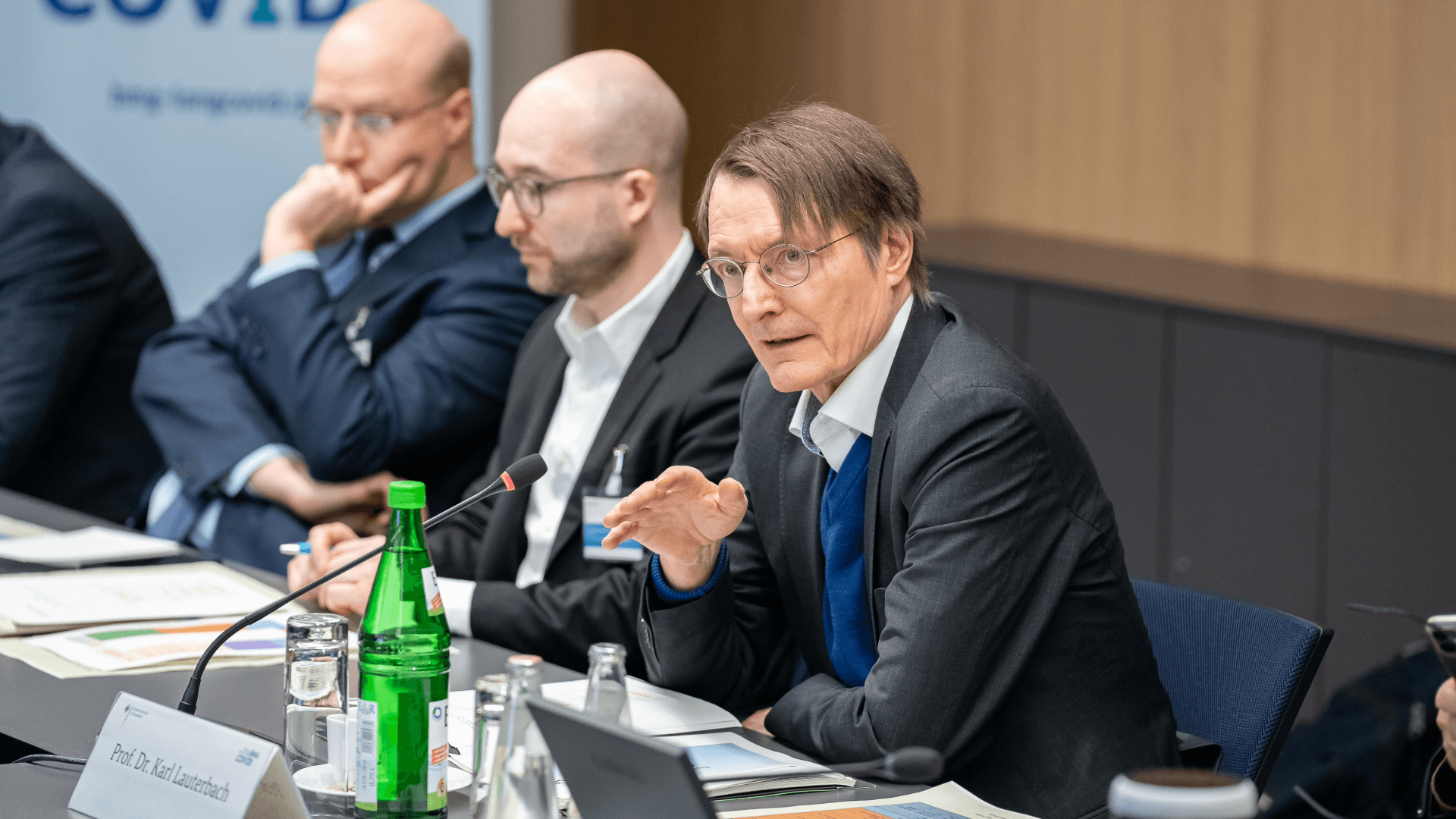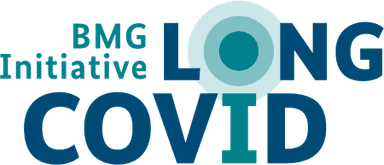Long COVID round table - March 2025
Experts, patient advocacy groups and relevant public health stakeholders once more came together with Federal Minister of Health Prof. Dr Karl Lauterbach on 31 March 2025 in Berlin to exchange their views on the latest developments and the measures launched by the Federal Ministry of Health in the field of Long COVID. A particular focus was on a participation process initiated by the Federal Ministry of Health entitled “Long COVID among children and adolescents”, the Federal Ministry of Health’s funding priorities on pilot projects regarding the care of children and adolescents with Long COVID and patient-oriented research, as well as the work of the Expert Group on Long COVID Off-Label Use.

© BMG/ Thomas Ecke
Focus: Long COVID among children and adolescents
First, the results of the “Long COVID among children and adolescents” participation process initiated by the Federal Ministry of Health were presented. Its objective was to identify the unique care and support needs of those affected and to develop specific approaches to improve their care. In addition to sick children and adolescents, this three-step process also included family members, teachers and care providers. Here it became clear that there is still a large amount of work needed both in terms of diagnosis and treatment as well as with schooling, care and recreation. More details available here.
The next key focus of the Round Table was eagerly anticipated. Four projects selected by the Federal Ministry of Health as the result of an invitation for research bids late 2024 that will be funded until 2028 with a total amount of 45m euros were presented under the banner of “pilot projects on the care of children and adolescents with Long COVID”:
- NGK4Family: This project of the “Nicht Genesen Kids” patient organisation is aimed at the families of children and adolescents who suffer from severe or most severe Long COVID and Myalgic Encephalomyelitis/Chronic Fatigue Syndrome (ME/CFS). It aims to strengthen the resilience and caregiving skills of family members and highlight their specific needs. To accomplish this objective, the project provides moderated online self-help groups, presentations, medical Q & A sessions, podcasts and educational videos. These formats offer emotional support, promote exchange and convey practical expertise. At the same time, the needs of the families are documented anonymously and made available both to researchers and medical staff so as to enable a more needs-based and family-oriented care. The project thereby not only provides direct assistance to affected families, but also contributes toward systematically improving the current healthcare situation.
- PEDNET LC: This pilot project establishes a specialised network to build up a nationwide healthcare landscape for the harmonised, standardised and faster individual diagnosis and treatment of children and adolescents with Long COVID-like illnesses, including ME/CFS and symptoms in temporal relation to a COVID-19 vaccination. Coordinated by the network, interdisciplinary, needs-oriented care is in the process of being set up at 20 specialised Comprehensive Care Centres. The objective is to secure early and quality-assured treatment for these complex disorders. In addition, findings from research, registration data and education initiatives are used to advance care and treatment.
- COVYOUTHdata: This project aims to detect the long-term effects of COVID-19 in children and adolescents at an early stage, understand these better and manage them more effectively. To this end, data from the statutory health insurance (GKV) are retrospectively analysed in order to identify risk factors and ascertain the frequency of post-COVID symptoms. An additional focus lies on the development and validation of a specific case definition for post-COVID syndrome (PCS) in this age group. Furthermore, symptoms in relation to COVID-19 vaccinations will be investigated by combining GKV benefit data with vaccination data. Moreover, a subjective benefit-risk analysis of COVID-19 vaccinations among children and adolescents is carried out using qualitative surveys.
- PedMYCVAC – Follow-up: This project examines the progression and potential long-term effects of myocarditis among children and adolescents following mRNA-COVID-19 vaccination. This project prospectively records new suspected cases and follows up on already documented patients. Besides clinical symptoms and functional limitations, it also records MRT images and aspects concerning quality of life. A comparison with vaccination-unrelated myocarditis cases should help to provide a better understanding of differences in the disease progression and potential risks.
Focus: the Federal Ministry of Health’s funding priority of patient-centred research into Long COVID
Another key focus of this exchange was the Federal Ministry of Health’s funding priority of patient-centred research into Long COVID. In this context, a call for research bids led to 30 projects being selected that will receive funds totalling 73 million euros by 2028. The head of the “LongCARE” coordination project as well as additional project leaders from this funding priority were invited to exchange their ideas on healthcare research.
- LongCARE: This project serves as a platform to coordinate and support the projects in this funding priority. The objective is to explore innovative care approaches, disseminate existing research findings and quickly translate new scientific insights into practice. The platform provides a central port-of-call for the interdisciplinary collaboration between researchers and care providers, helping to steadily improve the care of people with Long COVID thanks to its network and communication structure that is designed for the long term. LongCARE supports the development of joint standards, connects with existing health data infrastructures and contributes expertise regarding data protection and regulatory questions.
The aim of all the projects funded is for research findings that can inform the treatment of Long COVID to be translated as soon as possible into patient care and, conversely, for data from the clinic to be made available to researchers.
Further information about the Federal Ministry of Health’s funding priorities on healthcare research into Long COVID and on pilot projects for children and adolescents with Long COVID as well as the projects funded can be found on the Federal Ministry of Health’s departmental research page.
Additionally, the results of other research projects were presented, for instance on the appropriate inclusion of patients with post-exertional malaise (PEM) in research and care structures: In this context, scientists have pointed to some very positive results with targeted rehabilitation: Rehabilitation professionals could be made highly aware of PEM and Pacing. Personalised, carefully dosed exercise appears to show initial good results. In fact, the German pension insurance provider endorses this type of treatment for affected patients. However, some voices were also heard who, in light of the potential risks of activating rehabilitation within this patient group, warned against viewing rehabilitation measures as the method of choice. This should be carefully examined, since more than a few patients might get worse from too much exertion. According to the participants, the comprehensive training of doctors remains of central importance and should be continually expanded further. In addition, the necessity of further outreach care services was highlighted.
Focus: Expert Group on Long COVID Off-Label Use
Finally, the Expert Group on Long COVID Off-Label Use at the Federal Institute for Drugs and Medical Devices (BfArM) presented their latest results and started the presentation with some good news: It announced the publication of proposed assessments of specific active substances. The assessment is based on the preliminary results of an extensive evidence search covering a multitude of active substances and medicinal products from international studies. Moreover, the Group shared that it will expand its recommendations of medicinal products to treat Long COVID in the especially developed Treatment Compass. While to date the Compass primarily comprises therapeutic agents for adults, suggestions on how to treat children and adolescents are to be included as well. Minister Lauterbach once more took the opportunity to clearly emphasise the pioneering role held by the Federal Institute for Drugs and Medical Devices by international comparison, particularly with respect to medication treatment.
Outlook
After three hours of intensive exchange, Federal Minister of Health Prof. Karl Lauterbach saw off his guests with the following positive summary: “Our initiatives to help Long-COVID patients are showing some early successes. The healthcare research projects have been approved, children and adolescents are being helped in the context of the pilot projects, the list of medicinal products for the targeted treatment of Long COVID is in the works, the exchange with family members is leading to a better understanding of the needs of those affected. Unfortunately, we are still unable to cure Long COVID. But we can give the people still suffering from the effects of the pandemic hope and are continuing to work toward a cure. We will not relent in our efforts.
Additional information
Information on the “Long COVID in children and adolescents” participation process:
https://www.bmg-longcovid.de/en/discourse/participation-of-long-haulers-in-matters-of-children-and-adolescents-with-long-covid
Projects supported within the “Investigation and strengthening of needs-based care addressing the long-term health effects of COVID-19 (Long COVID)” funding priority:
https://www.bundesgesundheitsministerium.de/ministerium/ressortforschung/handlungsfelder/forschungsschwerpunkte/long-/post-covid.html
Expert Group on Long COVID Off-Label Use at the Federal Institute for Drugs and Medical Devices (BfArM): https://www.bfarm.de/DE/Arzneimittel/Zulassung/Zulassungsrelevante-Themen/Expertengruppe-Long-COVID-Off-Label-Use/_node.html
Guest list round table, 31 March 2025
Dr. Susanne Armbruster, Kassenärztliche Bundesvereinigung (KBV)
Dr. Margit Aufterbeck, ifok GmbH
Prof. Dr. Uta Behrends, Technische Universität München (TUM)
Thomas Biewer, Bundesministerium für Arbeit und Soziales (BMAS)
Prof. Dirk Brockmann, Technische Universität Dresden (TUD)
Prof. Dr. Karl Broich, Bundesinstitut für Arzneimittel und Medizinprodukte (BfArM)
Gritt Buggenhagen, ME-Hilfe e.V.
PD Dr. Roland Elling, Universitätsklinikum Freiburg (UKF)
Erkan Ertan, Arbeitsstab Beauftragter der Bundesregierung für die Belange der Patientinnen und Patienten
Prof. Dr. Ursula Felderhoff-Müser, Deutsche Gesellschaft für Kinder- und Jugendmedizin (DGKJ)
Dr. Antje Hammer, Berufsverband der Kinder- und Jugendärzt*innen (BVKJ)
Thorben Heunecke, Post Vac Syndrom e.V.
Dr. Katharina Jakob, Bundeskanzleramt (BKAmt)
Prof. Dr. Volker Köllner, Charité - Universitätsmedizin Berlin
Dr. Thomas Maibaum, Deutsche Gesellschaft für Allgemeinmedizin und Familienmedizin (DEGAM)
Dr. Matthias Meergans, Verband forschender Arzneimittelhersteller (vfa)
Mareike Mitschele, NichtGenesen
Dr. Angela Neumeyer-Gromen, Deutsche Krankenhausgesellschaft e.V. (DKG)
Dr. Petra Nies, Gemeinsamer Bundesausschuss (G-BA)
Dr. Wiebke Pühler, Bundesärztekammer (BÄK)
Thomas Romes, Bundesministerium für Bildung und Forschung (BMBF)
Prof. Dr. Lars Schaade, Robert Koch-Institut (RKI)
Prof. Dr. Carmen Scheibenbogen, Charité - Universitätsmedizin Berlin
Dr. Franziska Seidel, Charité - Universitätsmedizin Berlin
Sebastian Semler, Technologie- und Methodenplattform für die vernetzte medizinische Forschung e.V. (TMF)
Dr. Sandra Stengel, Universitätsklinikum Heidelberg (UKHD)
Dr. Philipp Storz-Pfennig, GKV-Spitzenverband (GKV-SV)
Prof. Dr. Christian P. Strassburg, Universitätsklinikum Bonn (UKB)
Dr. Tanja Strieder, Robert-Bosch-Krankenhaus (RBK)
Johanna Theobald, Long COVID Deutschland
Prof. Dr. Nina Timmesfeld, Ruhr-Universität Bochum (RUB)
Nadine Ton, Post-Vac-Netzwerk
Dr. Daniel Vilser, AMEOS Klinikum Neuburg, Klinik für Kinder- und Jugendmedizin
Soleil Völkl, NichtGenesenKids e.V.
Prof. Dr. Martin Walter, Universitätsklinikum Jena (UKJ)
Dr. Marie Witt, Deutsche Gesellschaft für ME/CFS e.V.
Prof. Dr. Bernhard Wörmann, Charité - Universitätsmedizin Berlin
